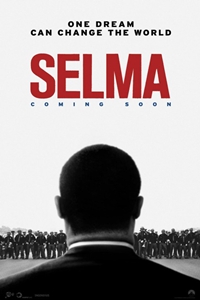 Selma
Selma
Starring David Oyelowo, Carmen Ejogo, Tom Wilkinson, Tim Roth, Lorraine Toussaint, and Oprah Winfrey
Directed by Ava DuVernay
Rated PG-13
Run Time: 127 minutes
Genre: Biographical Drama
Opens January 9th
By Eric Forthun of Cinematic Shadows
Ava DuVernay's Selma portrays the Civil Rights movement with subtlety, frankness, and compassion. It makes for one of the year's biggest triumphs and one of the most powerful films I've encountered in years. Focusing on the aftermath of the Civil Rights Act in 1964, the story navigates the fight to secure equal voting rights in many southern cities, including the titular Selma, Alabama. The man leading the way is none other than Martin Luther King Jr. (David Oyelowo), who continues to preach and advocate for a peaceful advancement of African American rights. His views are divisive but undeniably effective, particularly in his approach to getting legislation pushed toward Congress and rallying citizens. His biggest threat, though, is the growing opposition toward his efforts, namely whites in the South that do not want their social order disrupted. It's a message that feels mournfully relevant to modern issues as race relations continue to grow tumultuous in certain Midwest and Southern cities, particularly with police brutality.
Martin's personal life comes to the surface in regards to his messy marriage with Coretta Scott King (Carmen Ejogo). Their lives are marked by Martin's public image threatening their security while also creating a private ego that leads to adultery and foolishness on Martin's part. King's struggles with President Lyndon B. Johnson (Tom Wilkinson) also have an impact on his ability to move forward, leading to an increasingly bitter people that must face the violent threats emerging from whites. Murders happen without remorse and many white citizens treat African Americans as undeserving of respect or the ability to exercise their duties as citizens of the United States. George Wallace (Tim Roth) is one of the many ruthless men in power that cannot fathom the idea of whites having to surrender anything in their way of living as a means for equal rights. The film is mostly marked by vignettes that all centralize in Selma, notably with the march toward Montgomery and the support that Dr. King receives from people outside of the South.
Ava DuVernay has crafted a gorgeously rendered, intimate, and deeply triumphant feature. Her work behind the screen is subtle and open; nothing seems to be shrouded behind a manipulative lens. Rather, she lets the actions speak for themselves and mostly observes the world through the eyes of the characters on screen. If injustice is seen, the camera holds and lets the audience ponder, and acts of kindness carry the same emotional weight. There's a scene early in the film revolving around a church bombing with children involved. It's traumatic, brutally affecting, and altogether shocking. The scene needs to strike that chord, though, so the use of conversational, anticlimactic dialogue beforehand underlies the harshness of such a callously unexpected, life-ending action. That's a further testament to Paul Webb's brilliant script and Bradford Young's quietly effective cinematography. What remains so fundamentally impressive about Selma is the way it prefaces every scene with monumental impact; an attempt at voting from an elderly black woman (played by producer Oprah Winfrey) that gets denied sets the tone and atmosphere for the film's drive.
The film moves in between sympathy and idolization by underlying Martin Luther King Jr.'s flaws throughout the narrative. David Oyelowo's turn starts as a man acting like the famous historical figure, only to turn into a wholly realized, nuanced take on a troubled man with too much on his plate and not enough time to accomplish everything he desires. There's heartbreak in Oyelowo's turn, but also bite and gravitas. It's incredible. Carmen Ejogo's turn is equally sublime, with even Tom Wilkinson's standing president feeling like a realized, embattled human being. These performances allow the heated energy and passion to emerge and overpower every emotional layer of the film. Few films carry that aura and power in each frame. Selma, then, is a socially conscious and tragically necessary masterpiece, serving as a reminder that change has not fully come but that a passion for equality is needed from every citizen to be accomplished.









